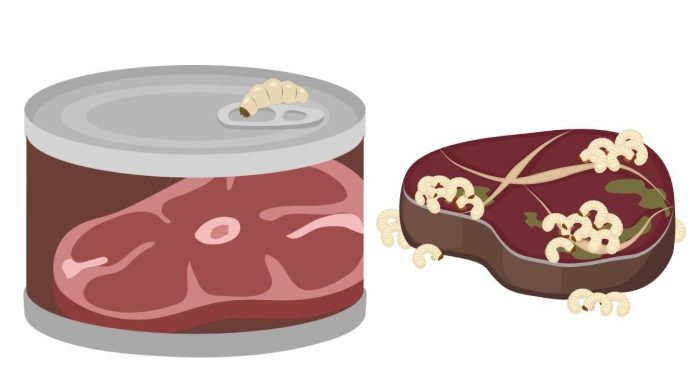Maggots are the larvae of certain types of flies, especially blowflies, which lay their eggs on decaying organic matter, including meat. When it comes to pork or any other type of meat, maggot growth depends on several factors, including whether eggs are present, the conditions within the container, and the environmental factors like temperature and moisture. Let’s break it down in more detail:
1. Eggs and Larvae
- Eggs: Blowflies or other types of flies can lay their eggs on meat if it’s exposed to the air. The adult flies are attracted to decaying meat, which provides a good environment for their offspring to grow.
- Contamination Before Sealing: If pork or any meat is contaminated with fly eggs before being sealed in a container, it’s possible for those eggs to hatch inside the container if the conditions are right. The eggs typically hatch within 12-24 hours, depending on temperature.
2. The Sealed Environment
- Airflow: Maggots require some airflow to breathe during their developmental stages. In a completely airtight container, it’s unlikely that maggots could grow because they wouldn’t have access to oxygen. However, if the container isn’t perfectly sealed and there’s some small amount of air or moisture, it’s possible for the eggs to hatch, but the larvae would struggle due to lack of oxygen.
- Moisture: Maggots need moisture to develop. If the meat is sealed in a container with enough moisture, it can create a humid microenvironment that could support the larvae’s growth for a while.
3. Temperature
- Heat and Growth: Maggots develop fastest in warmer temperatures. At higher temperatures (around 70-85°F or 21-29°C), larvae can grow rapidly. At colder temperatures, such as refrigeration (below 40°F or 4°C), the growth of larvae or eggs will be significantly slowed or stopped. Freezing temperatures (-18°C or 0°F and below) will kill any larvae or eggs.
4. Time
- Development of Maggots: After the eggs hatch, the larvae (maggots) will begin feeding on the meat. Within a few days, they can mature into larger maggots and eventually pupate into flies if the conditions are ideal (warm, moist, with enough food). However, in a sealed, airtight container, this process would likely be interrupted by the lack of air.
Conclusion
- If pork or any meat is sealed in a completely airtight container, maggots would not grow because they need air to breathe.
- If the container is not perfectly sealed, and eggs were present before sealing, and if there’s some moisture and warmth, maggots could hatch and begin to develop, but they might not thrive for long in a fully sealed container due to lack of oxygen.
- Prevention: To avoid maggots and contamination in general, always store meat in sealed, refrigerated, or frozen environments. And ensure that meat is properly cooked before consumption.
In summary, while maggots typically need air to grow, if there was some moisture and contamination of eggs before sealing, and if the environment inside the container allowed, maggots could still potentially develop, albeit with some limitations.


